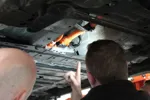Those demands have affected oil make-up. Market research group Kline estimates that in the
UK minerals account for 35%, part/semi-synthetic 40% and synthetic 25%.
But while the product has become more sophisticated, consumers have some catching up to do.
“Most people don’t know what brand of oil is in their car,” said Gudge – a view borne out by Mobil which questioned just over 1,000 drivers.
The exercise revealed that almost half did not even know that oil is used to lubricate the engine and only 6% were aware of its benefits in protecting and prolonging engine life.
Oil checks, too, seem to be arbitrary.
Another study, this time by Chevron, indicates that nearly 50% of motorists believe that topping up is not necessary between services, with just over 40% saying that while they do check their dipstick, it’s not done on a regular basis.
That’s perhaps a characteristic of poor vehicle maintenance standards, used as one of the justifications for retaining the current MoT system.
The government’s change of heart has brought limited relief to the franchised sector.
Close to 26 million MoTs are carried out on cars in the UK every year, with around 7.8m leading to further service and/or repair work.
The potential for using the MoT as a hook for retaining customers is evident from the practice of offering discounts on the test fee as part of service deals, but franchised workshops capture only 7% of MoTs.
It prompted Head to comment: “Franchised dealers should bear in mind that taking a greater share of the MoT market will not only increase workshop absorption, but can also present a valuable upsell opportunity through additional parts sales – either through work required on the vehicle to pass the MoT, or through oil changes – with new or lapsed customers.
“Of the 7.8m MoTs which lead to service and/or repair work, almost half are also accompanied by an oil change – despite not being an MoT requirement.
“As a percentage of buy-in cost, premium lubricants are one of the most profitable aftersales products stocked by a franchised workshop.
“Crucially, dealers need to ensure that service reception staff have the ‘soft’ customer handling and upselling skills to enable them to successfully promote an oil change when booking an MoT, or even persuade customers to buy a one-litre oil top-up pack to keep in the boot.”
The low penetration of franchises for MoT work is reflected in market share for oil.
The total UK oil market is estimated at around 130m litres a year, of which the franchised sector accounts for around 47m litres.
But according to Shell, it’s not just the franchised garages that could be doing more to boost sales revenue.
After questioning more than 200 garages, both franchised and independent, it concluded “that at least 60% are not taking the opportunity to proactively help customers select high quality lubricants”.
It’s certainly not for lack of support from suppliers – their portfolios bulging from point-of-sale literature to training pro-grammes for service advisers and even workshop equipment.
This is not done for any altruistic reason, for as a report by Sewells Information & Research hinted, garages appear to view oil from one supplier as much the same as another.
“So when respondents were asked what would persuade them to change their supplier, an extremely high number referred to price or a similar change motivator.”














Login to comment
Comments
No comments have been made yet.